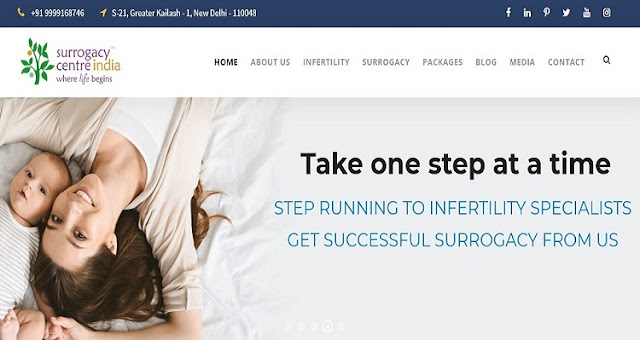Are you planning to
consider the option of surrogacy to make your dream come true? When couples
face difficulties while going for childbirth but are keen to expand the family,
a surrogacy centre in Delhi comes to help. You can seek all
the information you want about surrogacy from this centre and appoint them to
manage the entire procedure easily.
If you want to make
the surrogacy journey free from hassles and trouble, you must know the
following about a surrogacy
centre in Delhi.
- Contacting the surrogacy centre is one of the commonest ways to go about with the journey.
- These centres have professionally-trained experts looking into the procedure and helping you understand every aspect of this journey.
- The surrogacy centres have full-time professionals rendering services, such as coordinators, egg-donation coordinators, legal teams, and accountants, to helps people manage the psychological, emotional and technical aspects.
- They also provide support services to the intended parents and the surrogate mothers.
- A
full-service surrogacy centre in Delhi provides support and
guidance throughout the entire procedure, while partial services may help the
intended parents find a matching surrogate mother.
Things to know
Even though it
costs the intended parents a bit more but the services are comprehensive. You
can get services at every stage of the journey and meet a team of experienced
social workers and lawyers through them. Many parents experience stress and
worries associated with the procedure, but the agency's support allows either
party to focus on the main purpose of surrogacy.
Services to get
The surrogacy centre in Delhi you hire offers a wide window of opportunities to ease the complications involved in the process. What are the services you may get from the surrogacy centre? Here is what you need to know.
- The process of application ensures that the parents and the surrogates are committed to the cause.
- The agency conducts screening services to ensure that the surrogates and the parents are perfect, whether emotionally or physically.
- They conduct consultation services allowing you to choose the programme or package of surrogacy.
- They are responsible for coordinating between the clinics and the entire staff of the centre.
- They aid in personal matching so that the intended parents and the surrogate enjoy the experience.
- The counseling services allow you to handle the surrogacy journey with ease.
- Many
of these services support either party after childbirth and ensure that the
surrogate mother and the baby are in good health.
Surrogacy agency and egg donation programme
When the surrogacy
centre is equipped with egg donation centres, it becomes easier to offer
additional services to the intended parents. You need to enquire about the
service of the centre before deciding to work with them.
Things to know about the centre
For the intended couples and the surrogate mother, the best surrogacy centre in India eases the complications from screening to birth. When selecting the organisation, here is what you must know.
- You need to enquire about the cost of hiring the agency and the fees they ask for.
- Does the agency offer legal services?
- How many years have they been in business?
- What is the process of screening for the surrogate and the egg donor?
- Can
you get reviews about the past clients from them?
You need to assess the agency's reputation from the start and check each of their services carefully before deciding to work with them. From the matching time to the agency's size and history, various factors may help determine the centre.





